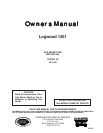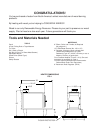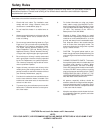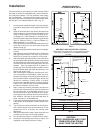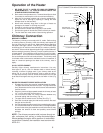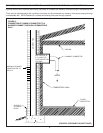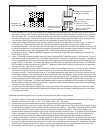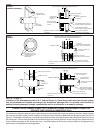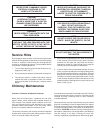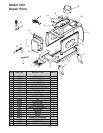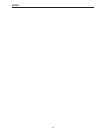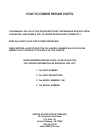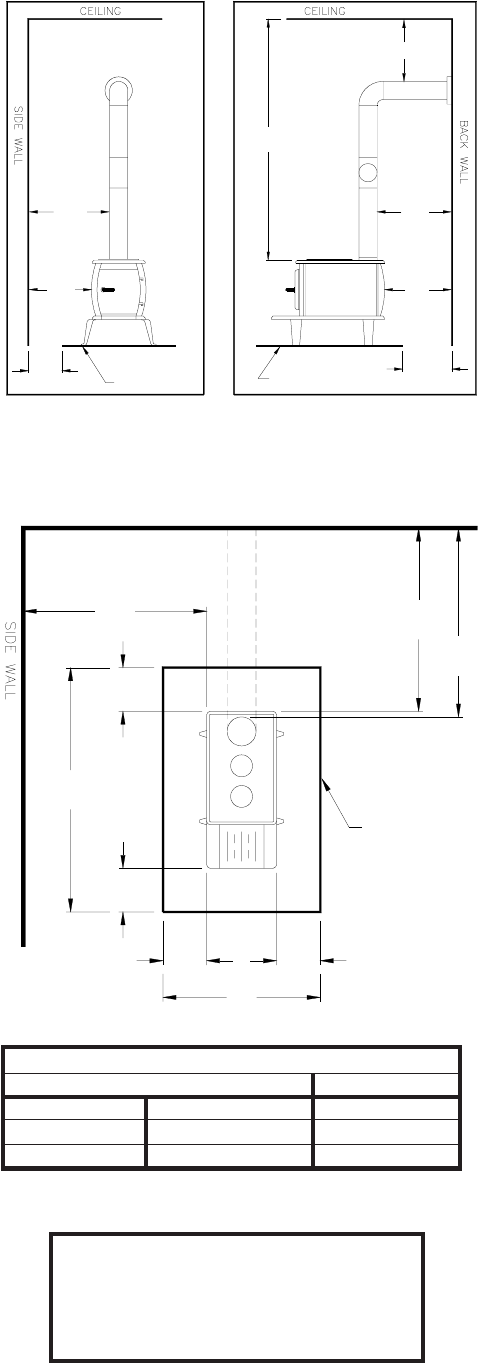
4
Place the heater on solid masonry or solid concrete. When
the heater is used on a combustible floor, use an Underwrit-
ers Listed floor protector. The floor protector must comply
with UL Standards. The base should extend at least 16"
beyond the door side of the heater and should extend under
the flue pipe if it is elbowed towards a wall. (Fig. 5).
Uncrate and/or unpack the heater, removing all pack-
ing material, being careful not to dispose of the Parts
Bag.
Open the front feed door and remove the parts from
inside the stove. You should find the following: Hearth
Plate (1); Solid Damper (1); Lids (2); Pivoting Top (1);
Lid Support (1); Parts Package (1) containing nuts,
bolts, door handle, door latch and securing hardware;
Legs (4); Cast Iron Collar (1); Cast Iron Damper (1);
Baffle Assembly (1); Lid Lifter (1).
Place cardboard or other soft material adjacent to the
stove and carefully turn the stove onto its top side
(bottom facing up).
Attach hearth plate to the front of the stove in its proper
location.
Attach both rear and front legs to the stove. Tighten the
nuts and bolts securely. The stove may now be
CAREFULLY turned over to stand on it's four legs.
Attach the baffle assembly and flue collar to the stove
by inserting the baffle studs thru the two holes located
on the top of the rear of the stove; place the flue collar
over the studs and mount using the proper nuts and
washers. Place lid support and lid in position on
pivoting top. Place the slide damper in position on the
top of the hearth plate and under the feed door, and
secure with screw in slot.
After consulting the installation instructions for mini-
mum clearances to combustibles, locate your floor
protector accordingly and carefully place the stove in
your selected location. Install stove pipe, elbows and
thimble as necessary, utilizing either a recently
cleaned and inspected masonry chimney (properly
lined) or a UL Listed chimney. Insure that the damper
provided is installed in the flue collar.
Again, check the following illustrations and be sure
you have the clearances shown from the heater and
the connector pipe to combustible surfaces. If you
have a solid brick or stone wall behind your heater,
you may place your heater as close as you wish to the
wall. However, if the wall is only faced with brick or
stone, consider it a combustible wall.
If your chimney drafts excessively, purchase and use
a Barometric Draft Regulator (DR6 available from
factory).
The chimney connection should be as short as pos-
sible, and the heater must have its own flue. Do not
connect this unit to a chimney flue serving other
appliances.
Use three sheet metal screws in each stove pipe and
or elbow joint to firmly hold the pipe together.
Do not install this heater in a mobile home or trailer.
Check your local building and insurance codes. The
installation must comply with their rulings.
1.
2.
3.
4.
5.
6.
7.
8.
9.
10.
11.
12.
14.
Installation
CAUTION!
KEEP FURNISHINGS AND OTHER
COMBUSTIBLE MATERIALS
AWAY FROM THE HEATER.
MINIMUM CLEARANCE
TO COMBUSTIBLE WALLS
FLOOR
PROTECTOR
FLOOR
PROTECTOR
FIG. 2
(60" MIN.)
18"
FIG. 3
34"
865mm
26"
660mm
28"
712mm
28"
712mm
20"
508mm
37-1/2"
953mm
458mm
FLOOR
PROTECTOR
BACK WALL
DASHED LINES
SHOW STRAIGHT
OUT CHIMNEY
CONNECTOR
28"
60"
34"
865mm
26"
660mm
NON- COMBUSTIBLE
CONSTRUCTION IN
ACCORDANCE WITH
NFPA 211
HEATER/FLOOR PROTECTOR LOCATION
(Dimensions are required for non-protected surfaces.
See chart for dimensions for protected surfaces.)
FIG. 2
FIG. 3
Protected Surfaces (NFPA 211)
Parallel Corner
Side Rear
12-inches 12-inches 12-inches
305-mm 305-mm 305-mm
FIG. 4
6"
153mm
6"
153mm
6"
153mm
16"
407mm
28-3/4"
730mm



